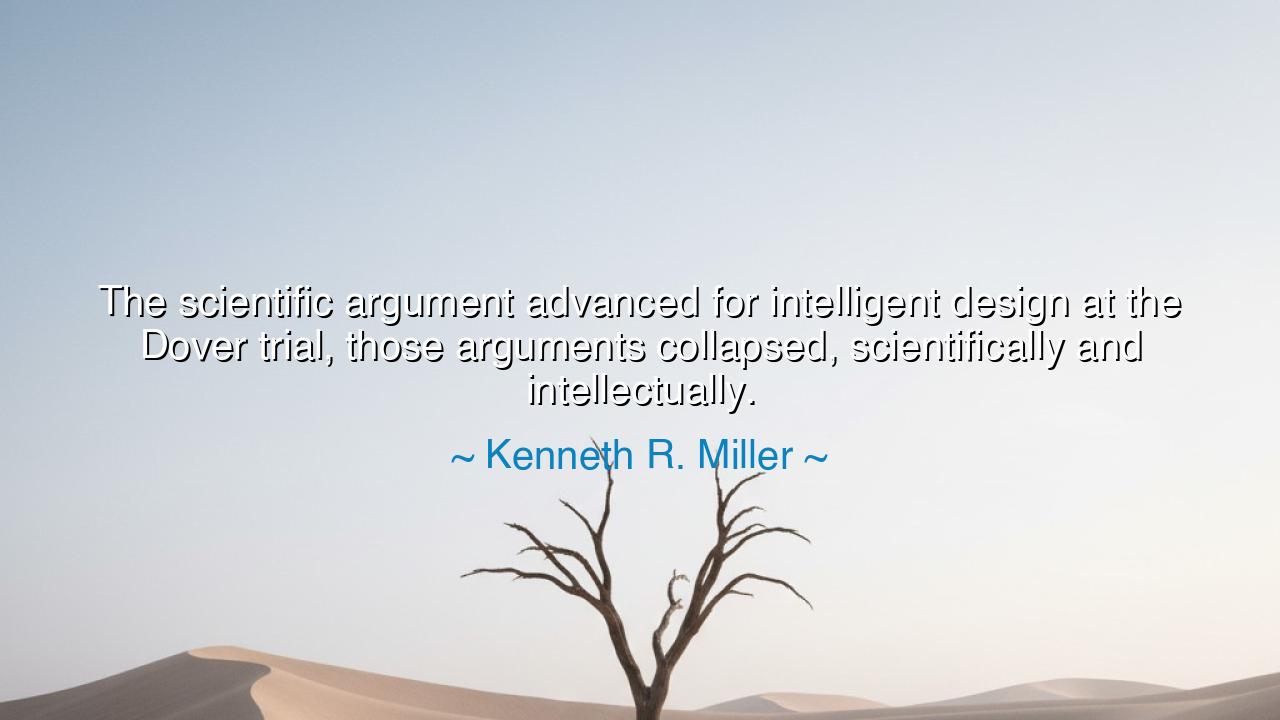
The scientific argument advanced for intelligent design at the
The scientific argument advanced for intelligent design at the Dover trial, those arguments collapsed, scientifically and intellectually.






In the solemn voice of Kenneth R. Miller, the biologist and witness of truth, we hear a declaration that rings like the tolling of a great bell: “The scientific argument advanced for intelligent design at the Dover trial, those arguments collapsed, scientifically and intellectually.” These words speak not merely of a courtroom, nor of a single debate between men of learning—they speak of the eternal struggle between truth and illusion, between the light of evidence and the shadow of belief untested. In this moment, Miller became not only a scientist, but a guardian of reason, defending the sacred temple of inquiry against the encroaching fog of false certainty.
The Dover trial, known in full as Kitzmiller v. Dover Area School District, was no ordinary dispute. It was a battle fought upon the fields of intellect, where the armies of faith and science met face to face. In that courtroom, some sought to replace the slow, sacred labor of discovery with the easy comfort of intelligent design—an idea claiming that life’s complexity must be proof of divine craftsmanship. Yet as the proceedings unfolded, as evidence was weighed and logic tested, the arguments of design could not bear the weight of reason. They collapsed, as Miller said—collapsed not in anger, but under the gentle, inexorable pressure of truth.
Such collapse is not new to history. The great philosopher Galileo Galilei, centuries before, faced the same tempest. When he turned his telescope to the heavens and found that the Earth moved, he too met those who clung to old certainties. They, like the defenders of intelligent design, sought to preserve comfort over clarity. Yet truth, once revealed, cannot be unlearned. The orbits of the stars would not bend to doctrine, just as the evidence of biology would not bow to ideology. Science does not serve belief; it serves reality. And though men may delay it, they cannot forever silence its voice.
The collapse of false arguments is not a tragedy—it is a renewal. It is the falling of the old temple before the rising of the new. When an idea crumbles under scrutiny, it does not mark the death of inquiry, but its purification. For every failed theory, every refuted claim, clears the ground for deeper understanding. In this, Miller’s words are both a warning and a blessing. They remind us that truth fears no test, that reason is the forge in which wisdom is tempered. The scientist’s duty is not to defend what he wishes to be true, but to uncover what is true, no matter how uncomfortable that truth may be.
In the ancient world, the philosopher Socrates once said that the unexamined life is not worth living. In Miller’s time, this became the unexamined idea is not worth believing. The men of Athens condemned Socrates for questioning their cherished illusions; the advocates of intelligent design faced the same reckoning. For when ideas refuse to be questioned, they cease to be alive. They become idols—silent, unmoving, untrue. And when such idols are struck by the hammer of reason, they must fall, for truth is a living flame, and all that is hollow must burn before it.
The lesson, then, is clear as daylight breaking over the ruins of ignorance: let no argument, no doctrine, no conviction stand untested. The beauty of science, and indeed of all wisdom, lies not in certainty but in courageous curiosity. The collapse of falsehood is not failure; it is progress. Just as the old forests must burn to make way for new life, so must the mind shed its errors to make room for understanding. Every generation must hold its beliefs to the fire, for in that fire, only truth endures.
And so, my child, when you encounter the clash between conviction and evidence, do not fear the fall of what is false. Rejoice in it. For when Miller spoke of the collapse of those arguments, he spoke not of destruction, but of creation—the rebirth of clarity after the storm. Stand always with truth, even when it unsettles you. Test what you believe, question what you cherish, and trust that what survives your questioning is worthy of your faith. In the end, it is not belief that sustains the world—it is understanding, born of patience, courage, and the eternal light of reason.






AAdministratorAdministrator
Welcome, honored guests. Please leave a comment, we will respond soon